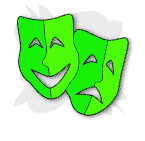

 |
|
||
|
|
A Review
What Do You See? The houselights dim, shadows stretch across the stage at the Calderwood Pavilion and an oversized canvas that's been hanging with its back to us at the lip of the stage flies up to reveal the artist. He's standing, facing us, but he's actually staring at his work.
This is the often-anguished world of Russian-born abstract expressionist Mark Rothko, as depicted by John Logan in the two-character "Red" now being given a thrilling presentation by SpeakEasy Stage Company. (“Red” received the Tony Award as Best Play in 2010.) "Red" takes a fictionalized look at Rothko, played with brilliance by Thomas Derrah, in the late fifties when he was commissioned to paint several murals for the new Four Seasons restaurant in Manhattan. Rothko created more than three dozen pieces in order to get the handful that would make up the series that would go to the restaurant. However, when he visited the Four Seasons after its completion but prior to the delivery of his artwork, he was so enraged by the restaurant's pretentious atmosphere and clientele that he returned the payment in a fury and kept the murals (which today hang in museums in London, Washington DC and Japan). Rothko is someone who rants, who raves. In his mind, his every word is worth hanging on. Yet we soon discover that he doesn't even remember a lot of what he says in these passionate moments of possession.
Ken's job is to do exactly what he's told to do and fill every task assigned him, whether it be mixing paint or running for cigarettes. What neither realizes initially, is that his extended job, in the larger scene, will be to replace Rothko in the world of art. Rothko will eventually witness his own obsolescence, just as he witnessed the days passing for others. The throne will be assumed by a new heir. This is the natural progression. It does not lessen the achievements and significance of those who have come before, but it does mark a passage as the new generation steps up to speak. And while Rothko insists the relationship is one of employer-employee, it does become a master class in which both sides volley for the intellectual point. The names and philosophies of Freud, Nietzche and Jung are furiously splattered through their debates like paint on a canvas. Rothko resents those who have become successful. He resents those who judge his work. He even resents those who purchase his work. One gets the impression that Rothko would have (or perhaps should have) simply remained a recluse in his darakened studio, painting with no contact with the outside world. Never see another person. Never witness someone else's art. And never allow his creations, his children -- so to speak -- to leave. He's so violent in his opinions that, at times, he's scary. Yet he speaks with such confidence and conviction, which is more Derrah's electric, obsessive performance than what's on the page. Derrah is so expressive, so driven and gives such a guttural, physical performance that you believe he is the artist he depicts. Director David R. Gammons, meanwhile, keeps the wire taut as Rothko unpredictably prowls the creative wrestling ring. As Ken, Olsen clearly has the lesser platform for the evening. Still, he holds his own as the young talent. Together, the two share a frenzied but smartly choreographed "priming the canvas" scene that's breathtaking. In the end, Rothko seems the epitome of the tortured artist. While his process is sometimes difficult to witness, it’s always thrilling to watch in the hands of the talented artists on stage. SpeakEasy Stage Company's "Red" is at TheCalderwood Pavilion through February 4. For information, call 617-933-8600. -- Production Photos: Craig Bailey/Perspective Photo -- OnStage Boston 01-11-12
|
||||
To
receive an email Update when new pages are posted at OnStage Boston, click
here. |
|||||
©
2002-2004 RJD Associates. All Rights Reserved. No portion of this site may be reprinted or reproduced without prior written permission. |
|||||